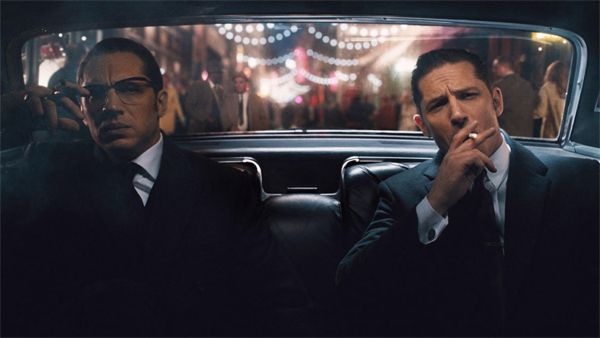
As you may recall, I was very excited about the film Legend, a biopic of the Kray twins, two gangsters whose organized crime network terrorized the East End of London in the '50s and '60s, because it stars two Tom Hardys.
The film came out in very limited release earlier this year, and now it's available for rental, so I thought I'd give it a quick review, for any other Hardy Heads who are wondering if it's something they'd want to watch.
The Krays were terrible people. Really just a couple of brutal dudes. And this film does not sugarcoat that. There are multiple scenes of graphic violence, so if you can't stomach that sort of thing, I can't say this any more plainly: Skip this film.
If you're like me, and whether you're willing to watch violence depends on the context, I'll give you my impression: Whether violence is gratuitous is so subjective, but, in my opinion, the violence was not gratuitous, even though it was at times graphic. It is, after all, a story about gangsters renowned for their violence.
I didn't come away with the feeling that the harm they did to other people—and each other—was being glorified, partly because director Brian Helgeland took care to center the horrified reactions of both victims and witnesses.
The film spans the length of Reggie Kray's relationship and short marriage to Frances Shea. She is the narrator, and [big spoiler warning here] continues her narration even beyond her death. Shea took her own life to escape her marriage, and her suicide is featured in the film.
There is a scene of domestic violence, but—and here's part of the reason I did not feel the depicted violence was gratuitous—it is not shown onscreen. We know it's happening; we hear it. We later see the attack marked on Frances' face. But we do not see Reggie Kray harming his wife. It is enough to know that he did it.
One of the things I found most compelling about Legend, which I'm not sure was an explicit objective of the filmmakers, is that, in part because of the timeline centering on Frances' marriage to Reggie, it serves to function as an allegory for domestic violence. The cycle of charming and abuse. The gangsters ingratiate themselves with charm, but are ever more dangerous the more intimately involved one gets with them.
How could it be that the community would ignore their menace, would patronize their clubs and casino, would be dazzled by their style? Well, in much the same way Frances was taken by Reggie's charms, and became imperiled when she didn't want to bend unilaterally to his will.
Domestic abusers don't always just deceive and hurt their partners; they often deceive and hurt their whole communities. Their abuse is aided by authorities who are keen to look the other way, or who are disempowered by the influence of the extremely wealthy—who, as Frances observes, have a lot in common with criminals, and who are fascinated with proximity to danger to spice up their lives, rendered boring and secure by virtue of their privilege. Often their victims realize too late there is no way out, and trying to get out can become even more dangerous than staying.
This is part of the story of the Krays.
Legend does not pass the Bechdel Test—but it also exposes the limitation of the Bechdel Test, in that Frances is the narrator and one of the key players, and has some of the most important dialogue in the film.
After she has left Reggie, he comes looking for her at her brother's flat. He is still hopeful, after attacking her, that they will get back together. "I thought we'd have a couple of kids," he says. "Why?" she asks him. "So you could use them against me?"
It is a powerful scene. [big spoiler warning here] Reggie continues to cajole her, and he tells her he will take her on a trip, anywhere she wants to go. "Ibiza," she tells him. We think she is conceding to him, giving into his charms, but she is instead realizing there is no way out for her. He will never let her leave. Only when we see her sitting at her vanity, taking enough pills to end her life, do we understand that she agreed just so he would go. She is resigned to never being free from him again, except in death.
[Spoiler warning continues] And even in death, Reggie would not let her go. Lying on a slab in the morgue, she is without her wedding ring. Reggie puts the ring back on her finger. It is chilling.
[End spoilers] I don't know if Legend is a great film, but it is a good one. It is beautifully shot and I liked a lot of the dialogue and the structure of the film. Tom Hardy is terrific in developing two fully realized characters. I have read that people who knew the Kray twins found his performances uncanny.
Other notes: Ronnie Kray was bisexual, and this features in the film, as does some homophobia related to his bisexuality, including anti-gay slurs. Ronnie was also mentally ill, and there is some apologia by his family that his harmfulness is strictly attributable to his mental illness.
If there's anything I've left out, it's not deliberate. I've tried to remember and include anything that I thought might be concerning.
And because I don't have a good ending for this review, I will just end it thus: TWO TOM HARDYS.
The end.




Shakesville is run as a safe space. First-time commenters: Please read Shakesville's Commenting Policy and Feminism 101 Section before commenting. We also do lots of in-thread moderation, so we ask that everyone read the entirety of any thread before commenting, to ensure compliance with any in-thread moderation. Thank you.
blog comments powered by Disqus